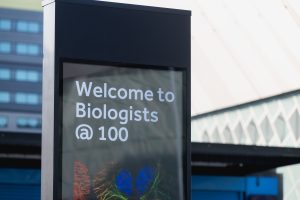12 May 2025
We were delighted to celebrate our 100-year anniversary with incredible biologists at our Biologists @ 100 conference in March 2025. We celebrated this unique moment with a careful approach to sustainability in every aspect of organising.
 We kept sustainability at the forefront of our minds when planning the conference and thank everyone involved in helping us make this vision real. We summarise below the ways in which sustainability played a key role at Biologists @ 100.
We kept sustainability at the forefront of our minds when planning the conference and thank everyone involved in helping us make this vision real. We summarise below the ways in which sustainability played a key role at Biologists @ 100.
Transportation:
- We chose Liverpool, UK, because it is a very walkable city and well-connected to public transport.
 We offered £150 incentives to international travellers to encourage our participants to travel sustainably and prioritise low-emissions transportation such as trains and coaches over flights.
We offered £150 incentives to international travellers to encourage our participants to travel sustainably and prioritise low-emissions transportation such as trains and coaches over flights.- We ran a blog competition to award £700 to the participant most committed to sustainable travelling. The winner will get a chance to publish the story about their inspiring journey on our website. The winner will be announced soon.
Venue:
- We partnered with ACC Liverpool to create an unforgettable conference without compromising on sustainability. ACC Liverpool is a carbon-neutral venue that aims to reach net zero by 2030 and has received the recognised Green Meetings Gold Accreditation.
- Every sustainable step taken by the venue reflected positively on the Biologists @ 100 conference. For instance, renewable energy sourced from 925 photovoltaic panels installed on the roof contributed to running our conference. The venue also ensured that all the waste generated at the venue was responsibly recycled, with zero waste sent to landfills.
Accommodation:
- We offered a range of accommodation options that shared our climate change concerns and took sustainable actions to mitigate it.
Catering:
- Together with all the catering providers, we managed to decrease the carbon footprint of our food to approximatively 2.21 kgCO2e/kgfood (scoring B on My Emissions), while we also prioritised seasonal, organic and local ingredients.
- We only used reusable or plastic-free biodegradable plates and cutlery.
Content:
- We had dedicated sessions in the conference based on climate change themes, starting with our ‘Experimental biology and impact: solutions to climate change and biodiversity loss’ sessions, with invited speakers from renowned institutions such as the Intergovernmental Panel on Climate Change (IPCC; Hans-Otto Pörtner) and British Antarctic Survey (Jane Francis).
- We hosted a lunchtime panel discussion entitled ‘Climate change: challenges and solutions for biologists’, where we explored how the community of biologists will move forward in light of global warming.
- Our conference had a ‘Sustainability zone’ for people to interact with organisations that drive meaningful sustainable initiatives. Representatives from The Woodland Trust, The Zoological Society of London and our Sustainable Conferencing and
 Communications Officer offered more details about the sustainable resources available for biologists.
Communications Officer offered more details about the sustainable resources available for biologists.
Social value:
- We wanted to make sure that we created opportunities for everyone to join the Biologists @ 100 conference, so we offered free registrations and incentives to cover the accommodation and travelling costs for 13 applicants from the Global South.
Suppliers:
- We minimised offering giveaways.
- We created guidelines for sponsors to make their booths eco-friendlier.
- We actively prioritised choosing products made of natural fibres or recycled plastic over raw plastic.
Waste:
- The waste generated at the venue was managed responsibly by Liverpool ACC as explained in the Venue section.
- We also plan to recycle and repurpose all the materials used to build The Company of Biologists booth.
 The delegates also enjoyed the sustainable features at Biologists @ 100. As Léa Manke (PhD candidate, Pasteur Institute, France) observed, “many nice sustainable actions were taken, including having plastic-free biodegradable plates and cups and vegetarian menus.”
The delegates also enjoyed the sustainable features at Biologists @ 100. As Léa Manke (PhD candidate, Pasteur Institute, France) observed, “many nice sustainable actions were taken, including having plastic-free biodegradable plates and cups and vegetarian menus.”
As biologists, we can accelerate the transition to a more sustainable future by approaching the challenges posed by climate change in both our research and the way we conduct our day-to-day activities. As Manke said, “It would be great if these academic meetings would lead to setting up collaborations between labs that can reduce consumption of materials in labs long-term. […] Science is about improving our future for everyone, and this also includes a healthy planet…”
We were glad to spread awareness about climate change through both our content and our actions, and we will continue doing so.








You must be logged in to post a comment.